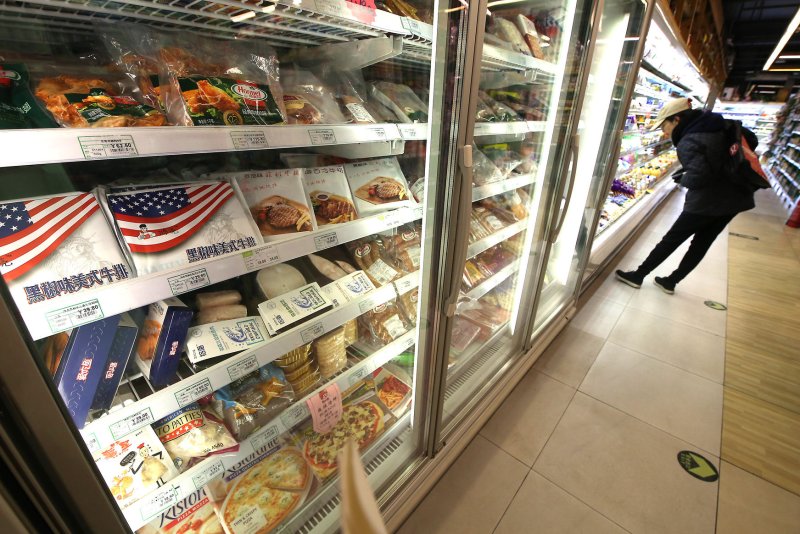1 of 2 | American pork is seen on sale at a grocery store in Beijing on April 3. Fiscal penalties from the United States and China took effect Friday, igniting what Beijing said is the largest trade war in economic history. File Photo by Stephen Shaver/UPI |
License Photo
July 6 (UPI) -- The United States imposed $34 billion in tariffs on Chinese products Friday, and Beijing hit back with its own fiscal punishment and slammed the Trump administration for igniting "the biggest trade war in economic history."
Twenty-five percent U.S. tariffs took effect at midnight and affect more than 800 Chinese products -- including industrial machinery, office equipment, electronics, medical devices and vehicles.
Beijing's taxes hit U.S.-made aircraft, cars, computer chips, fuel, pork and soybeans.
Trump has said the tariffs were imposed to pressure China into abandoning unfair practices like theft of intellectual property.
China, saying U.S. officials have violated World Trade Organization rules, said it had no choice but to respond with tariffs of its own.
"In order to defend the core interests of the country and the interests of the people, we are forced to retaliate," the Chinese Commerce Ministry said in a statement.
The United States will also impose 25 percent tariffs on another $16 billion in Chinese exports later this summer, something Beijing also said will not go unpunished. Those threats were followed by promises from both nations to tax even more imports.
President Donald Trump said more than $500 billion in Chinese products could ultimately be penalized.
Chinese policy analyst Yanmei Xie said the impact will be immediate and substantial for industries directly impacted by the U.S. tariffs.
"But it's the risk of escalation -- specifically Trump's $500 billion dollar threat, which would cover nearly all of China's exports to the U.S. -- that has analysts worried," Yanmei said. "The countdown is on as to what Trump will do next."
South Korea said Friday it fears the trade war will directly harm its economy, which is heavily dependent on exports from both the United States and China.
"The trade dispute between China and the U.S., the two biggest export destinations of South Korea, has intensified and the uncertainty over our economy has heightened as export industries raise concerns," Baek Woon-kyu, minister of trade, industry and energy, said at a government-expert meeting on the impact of the trade dispute.















